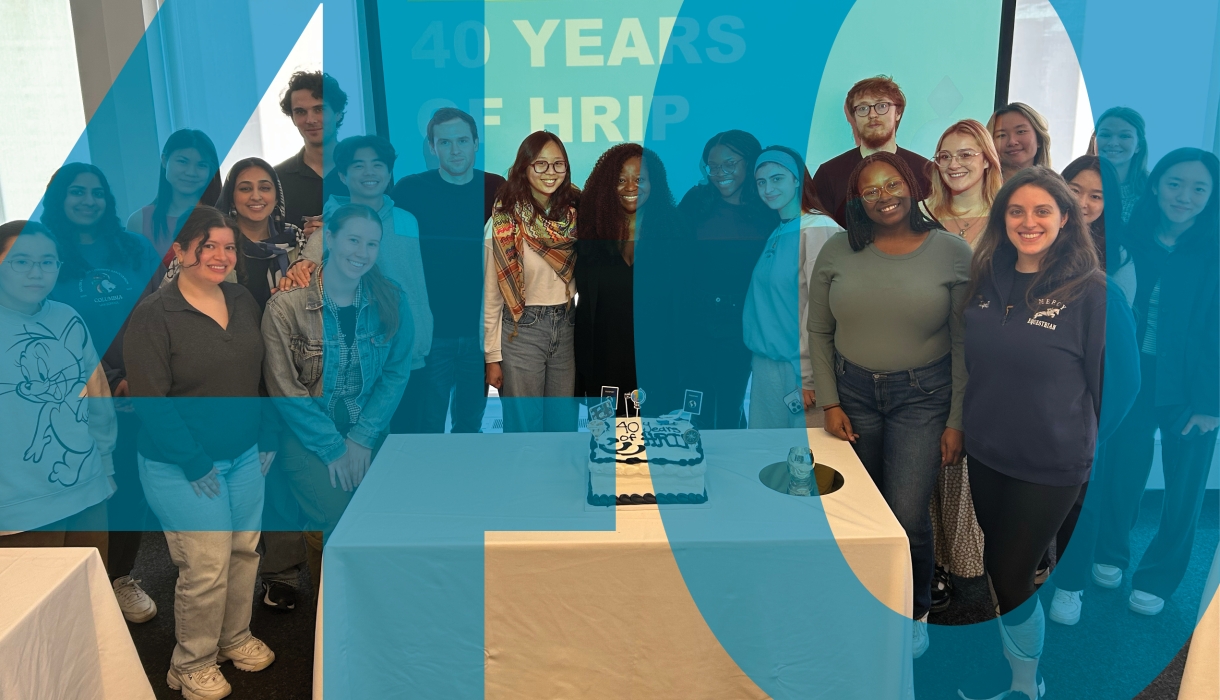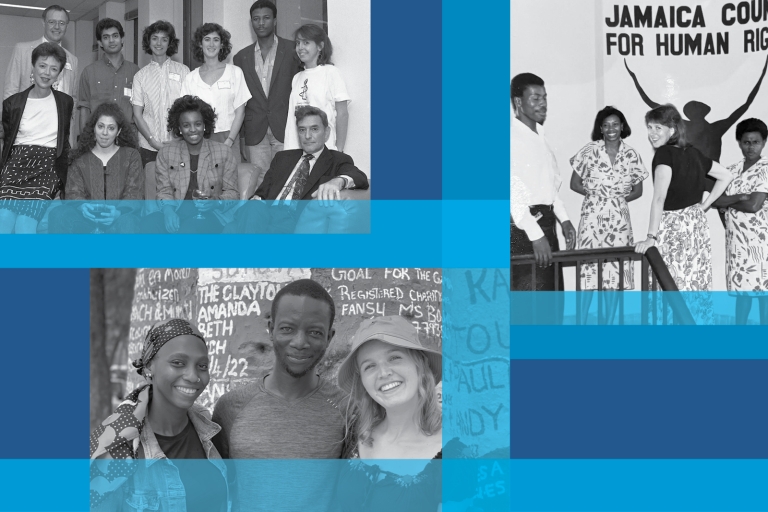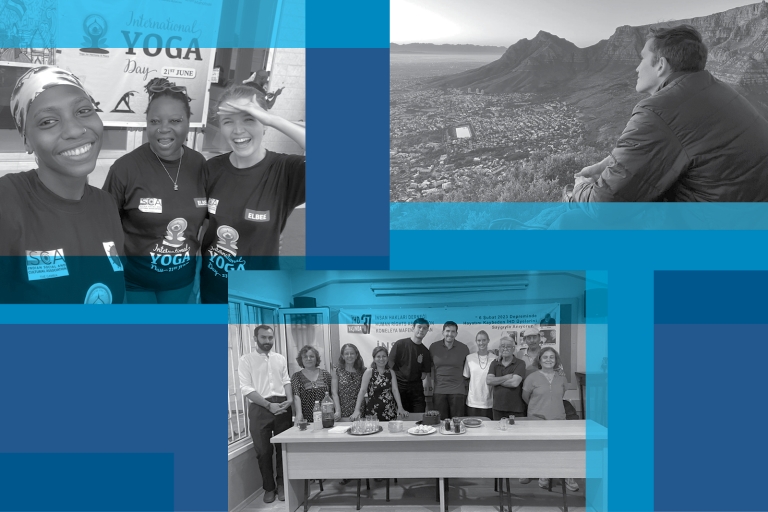Human Rights Internship Program Turns 40
Since the summer of 1985, hundreds of Columbia Law students have developed their human rights lawyering skills during fully funded summer internships overseas.

Pictured: Kerry McLean (center), director of Human Rights and Public International Law, and the 2025 Human Rights Internship Program participants celebrated the program’s 40th anniversary before departing for their summer internships.
The Columbia Law School Human Rights Internship Program (HRIP) has an impressive pedigree: It was founded by Professor Jack Greenberg ’48, who joined the Columbia Law faculty in 1984 after serving for 23 years as director-counsel of the NAACP Legal Defense and Educational Fund (LDF) and arguing 40 civil rights cases before the U.S. Supreme Court. For many years, HRIP’s director was Clinical Professor Deborah Greenberg ’57, a former employment discrimination attorney at LDF, who co-founded and co-directed the Law School’s AIDS Law Clinic. (The Greenbergs were married for 46 years, until Jack’s death in 2016.) And Professor Louis Henkin, who is widely credited with founding the study of human rights law, ran training sessions for the interns before they left for their posts.
For 40 years, HRIP, which is administered by the Office of Public Interest/Public Service Law and Careers (PI/PS Office), has secured placements and provided funding to support 1Ls and 2Ls spending their summers embedded in legal departments at international NGOs. (Initially, HRIP included both domestic and international placements, but today, domestic public interest summer internships are administered through Columbia Summer Funding.)
HRIP participants say the internships are life-changing, and they gain valuable experience in the practice of international human rights working with organizations such as Equality Now (Kenya), Thai Lawyers for Human Rights (Thailand), Initiative for Strategic Litigation in Africa (South Africa), and World Organisation Against Torture (Switzerland).
“There is a stark contrast between sitting behind a desk in New York and working on an issue that’s taking place in a country far away,” says Kerry McLean, an international human rights lawyer who serves as director of Human Rights and Public International Law in the PI/PS Office. “The students get the opportunity to have a better understanding of social, political, and cultural issues that concern the communities they are working with.”
McLean has developed connections with NGOs around the globe to help students secure summer positions, although some students find their own placements (subject to McLean’s approval). Approximately 20 students are accepted into the program each year; they receive training and support during the winter and spring before flying off to their internships. As part of their preparation for the summer, they attend a series of HRIP lectures on human rights law led by human rights practitioners. McLean hosts a group send-off where students share the details about where they will be interning with their classmates.
A Marquee Program
From its inception, HRIP was a lure for prospective students like Nancy Northup ’88, now president and CEO of the Center for Reproductive Rights. Northup remembers clipping a New York Times article about Jack Greenberg announcing the new internship program to a packed hall of Columbia Law students in the fall of 1984. “Columbia had always been high on my list of law schools, but that sealed the deal,” she says. “In college, I had studied the legal battle against segregation and was well aware of the Legal Defense Fund’s cases and Jack Greenberg’s role in them.”
Northup spent the summer between her 1L and 2L years at the Jamaican Council for Human Rights, which was the only human rights NGO on the island of Jamaica at the time. She had two different assignments: write clemency petitions on behalf of men on death row and help document extrajudicial killings by interviewing victims’ families. “It was my introduction to working at an NGO outside the United States and the methodologies that human rights lawyers use,” she says.

Four decades later, HRIP continues to be a draw. “I knew about HRIP in the abstract before I came to Columbia—I had done my due diligence—and learned more about it during my first semester at the Law School,” says Natalie Smith ’25.
Smith participated in the program both summers of law school. She spent her 1L summer in Mexico at the Institute for Women in Migration (IMUMI), where she did a combination of legal research and human rights monitoring as well as direct legal education. “I had only worked or studied in common law jurisdictions before, so having the opportunity to understand what it meant to do human-rights-focused work in a civil law system—where not every case has precedential weight and litigation or advocacy can be more case specific—was valuable to expanding my understanding of the way that human rights law works in other contexts,” she says. “It was also a phenomenal opportunity to do legal work in another language and build my Spanish legal vocabulary.”
Smith spent her 2L summer at Lawyers for Human Rights in South Africa supporting its Strategic Litigation Programme; she worked on litigation related to a wide range of human rights issues, including accountability for apartheid-era human rights violations, abusive litigation against human rights defenders, and South Africa's obligations under international law. South Africa's constitution has a more expansive vision of human rights than the much older U.S. Constitution, she notes, so her experience in that jurisdiction provided exposure to more creative and protective litigation strategies than would be possible under U.S. human rights law.
HRIP was one of the reasons Erica Smock ’95, the Law School’s dean for public interest/public service law and careers, chose to attend Columbia Law School; the program now falls under the PI/PS Office umbrella. “I was particularly looking for opportunities in international human rights spaces, and the program was well-established then under Deborah Greenberg,” she recalls. “The idea of working at a nonprofit in South Africa doing anti-apartheid work was really exciting, and that’s what I ended up doing.”
Smock, who wrote her undergraduate honors thesis on the role of the South African Council of Churches in anti-apartheid advocacy, worked at Chris Watters Attorneys, which represented the African National Congress on a variety of matters. “This will sound cliché, but that summer, I saw the power that the law has, and how it can be used for social change,” she says.
A Career Booster
Michael Garcia Bochenek ’95, senior counsel to the Children’s Rights Division of Human Rights Watch, participated in HRIP both summers of law school. After his 1L year, he worked in Zimbabwe, where there had been a raft of disappearances, extrajudicial executions, and other serious human rights abuses in the 1980s. The head of the legal services program where he worked had him review the documentation from these incidents, look for commonalities, and relate them to legal standards for human rights violations.
“The circumstances themselves weren’t a surprise,” says Bochenek, who had spent part of his undergraduate years at the University of Zimbabwe. “What was really helpful was to get a sense of how human rights lawyers might use individual accounts to build a case for systemic human rights violations.” Bochenek spent his 2L summer in Laredo, Texas, at the Refugee Assistance Council (whose staff attorney was Thomas Hutchins ’92); he worked with refugees seeking asylum who were locked up in a privately run detention center. “My role was to drive there every day and interview as many people as I could in a day and draft their declaration for their asylum claims.”

The internships provided invaluable context for the courses he took at the Law School with Henkin, Gerald Neuman, and other professors shaping international human rights law. He also took classes that focused on human rights issues, such as capital punishment and prisoners’ rights, and participated in the Family Advocacy Clinic and Fair Housing Clinic. These experiences led to his receiving a postgraduate fellowship at Human Rights Watch. “So that’s how my career started, and it would have looked very different if I hadn’t gone to Columbia and had all these experiences as a student,” he says.
Allison Love ’24 built an impressive human rights résumé at Columbia Law that includes two HRIP summers, which helped her secure a postgraduate David W. Leebron Human Rights Fellowship at the Global Justice Center in New York. After her 1L year, she worked remotely due to COVID–19 at the Commission of Inquiry for Cambodia, where she contributed to research on universal jurisdiction and supported advocacy on behalf of arbitrarily detained human rights activists. The following summer, she worked in the Gambia for the Women’s Association for Women and Victims’ Empowerment (WAVE). It was HRIP’s McLean who suggested WAVE would be a good fit for Love. “I had told her about my intersecting interests in transitional and gender justice,” says Love. “WAVE is an NGO made up primarily of former victims and survivors of human rights abuses during the 20-year regime of former President Yahya Jammeh that ended in 2017.”
At WAVE, Love worked with the organizers of the country’s first human rights and cultural festival, which was designed to highlight the country’s progress in the human rights sphere, including awareness of its ratifying and implementing the U.N. Convention Against Torture and Other Cruel, Inhuman or Degrading Treatment or Punishment. “We were figuring out how to talk about these legal developments in a way that felt meaningful to communities and people who had experienced torture and could seek justice within the Gambia’s domestic system,” she says. Love spent the second half of her internship traveling across the country with the Gambia’s National Human Rights Commission to hold workshops for local lawmakers, women’s groups, religious organizations, and law enforcement about how to implement the recommendations of the U.N. Convention on the Elimination of All Forms of Discrimination Against Women.
Love is grateful for the on-the-ground training HRIP provided. “It was one of the best surprises of my time at Columbia,” she says.
For Michael Weaver ’25, who spent his 1L summer in Istanbul at İnsan Hakları Derneği (IHD), a Turkish human rights NGO, HRIP was transformative. “It certainly shaped my academic journey the next year,” he says. At IHD, Weaver helped an asylum seeker who had been arrested during a Pride parade and faced the prospect of execution if deported back to Iran; the IHD team found the asylum seeker a resettlement opportunity in the United States through the United Nations High Commissioner for Refugees.
Weaver also worked on a research project at IHD about enforced disappearances. When he returned to the Law School, he wrote a note on the topic, to be published in an upcoming issue of the Columbia Human Rights Law Review, that proposes alternatives to the standards of the European Court of Human Rights so that states would need to disprove a disappearance by conducting an investigation. “It takes quite a bit of legal maneuvering because it is unheard of as a matter of fairness and justice to hold someone presumptively accountable based on an allegation, and that’s effectively what I am advocating international courts should do in cases against states as opposed to individuals,” he says. “Obviously, this came from a passion that was definitely a result of my time in Turkey.”
During his 2L summer, Weaver worked at the Southern Africa Litigation Centre to gain litigation experience, which led him to take Federal Courts and Criminal Investigations as a 3L to build his litigation tool kit. In September, he will begin practicing human rights litigation as a Columbia Law Global Public Service Fellow at the International Legal Foundation.
As a former participant of HRIP, Smock takes great satisfaction that the program initiated by legendary human rights law practitioners and scholars has shaped the careers of so many Columbians, including hers. “It sometimes amazes me that we’ve been able to offer these opportunities continuously for 40 years,” she says. “I know firsthand what an incredible opportunity HRIP is and how pivotal it can be in the life of a law student or young lawyer.”